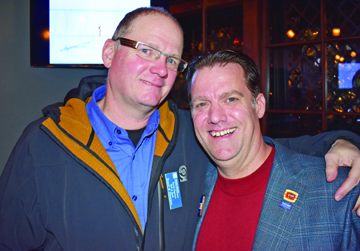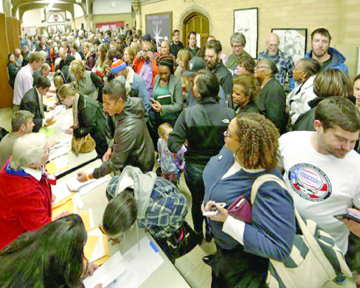by Julie Hayden

Family Ties: Steve Barlock, right, a GOP gubernatorial candidate is seeking to get on the ballot through the caucus system. He is pictured here with David Peterson, left, owner of the Bull & Bush. They both attended the Greater Glendale Chamber of Commerce Business After Hours at Salvage Restaurant last month. Barlock’s father Ed, an attorney, helped get the Bull & Bush off the ground in the late ’60s and early ’70s.
Colorado Republicans and Democrats are hosting their party caucuses in March 2018. And while the two parties do not see eye to eye on a lot these days they do agree on one thing. The precinct caucuses are a crucial part of the political process.
“When you attend your precinct caucus you can be a deciding vote of who gets on the ballot,” says Denver Republican Party Chairman Jake Viano. “This is where it all starts as to whose name is actually on the ballot. The people at the precinct caucuses are the ones who start the vetting process on all of the possible candidates.”
Mike Cerbo, Chairman of the Democratic Party of Denver, explains, “The precinct caucuses are grassroots democracy and that has a long tradition in this state.”
The caucuses are held the first Tuesday of March, this year that’s March 6, 2018. The precinct caucuses are held in neighborhood locations like schools, libraries or homes. People attend the caucuses to start the process of choosing candidates for the 2018 Democrat and Republican state primary ballots. Delegates are chosen at the precinct level to represent candidates at each party’s various assemblies.

2016 Democratic Caucus In Denver: Both political parties agree Colorado’s precinct caucus system is grassroots democracy at its best.
They will also help shape the party’s platform. “If you want to make the political party better, “Viano says, “Show up at the caucuses. This is where the platform starts. It’s your opportunity to have your voice heard on the candidates and the issues.” Political insiders say it’s also a good way to get to know your neighbors. “It’s a great way to meet like-minded people in your neighborhood,” Viano says.
In Colorado, candidates can get on the ballot by going through the caucus system or by gathering petitions. Some question the caucus system. Colorado’s Republican Party Chairman Jeff Hayes earlier this year sent a letter to county Republican officers in which he wrote: “Our caucus system is arcane and new people are often justifiably paranoid about missing key information or ‘insiders’ controlling access or process.” That drew immediate fire from others who say the precinct caucus system is the heart and soul of our democracy.
Many see neighborhood caucuses as the truest form of grassroots representation. Cerbo says, “Could the process be updated? Maybe. But the rules are tied up in statutory language and it could be hard to make a lot of changes.”
Party officers want to make sure people understand the ballot referendum passed by voters last year to have “open primaries” does not affect the precinct caucuses.
The June 26 Colorado Primary is open to unaffiliated voters this year. But to participate in the March precinct caucuses, you have to have been registered as a Republican or a Democrat since at least January 8, 2018, and at the address in the precinct since February 5, 2018.
Viano says he is pushing for record numbers of people showing up at the Denver Republican caucuses and hopes that enthusiasm continues through the November general election. He says, “We have to show up to help Republicans win statewide.”
Cerbo is also hoping for a strong turnout at the Democrat caucuses. “There is a lot of interest this year.”
Both chairmen advise get there early. The caucuses start at 7 p.m. and you can pre-register starting at 6:30 p.m. They wrap up at approximately 9 p.m.
To determine the location of your caucus and get further information visit www.colo radodems.org or www.cologop.org.
